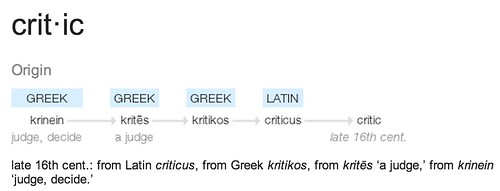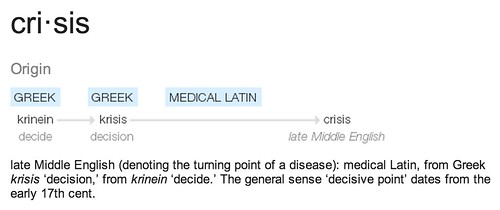One of the biggest perceived problems in the world of public
relations is criticism. Since the advent of the social media era,
handling criticism has been one of the top requests made of PR
professionals and agencies by brands and companies. Criticism is
perceived as a negative in the world of PR, especially by stakeholders
who are looking for applause and positive reviews.
For clarity’s sake, let’s specify that we’re talking about legitimate, honest criticism and not “trolling”, or baseless criticism that’s without merit. Legitimate critics will complain about their experience in a way that has a discernible issue, such as long wait times, poor customer service, etc. Baseless criticism tends to just be non-specific sentiment (“XYZ brand sux!”) or criticism about things that are irrelevant to the experience your brand delivers, like a coffee shop customer being unhappy about the size of your logo on the cup.
The perception that criticism is the enemy of good public relations is incredibly incorrect. Let’s look at three reasons why changing our view of criticism is important.
Who cares?
One of the most valuable things that criticism tells you is that you have an audience that cares. The worst outcome in public relations isn’t criticism or anger. It is apathy. When no one cares about you, no one thinks about you, no one has even the slightest inspiration to talk to you. Criticism may be telling you that something’s wrong, but you have enough brand visibility and loyalty to warrant feedback. Some companies would love that.
What your friends won’t say
At this year’s Marketo Summit, one of the keynote speakers had an insightful piece of advice for the audience: “don’t take criticism personally, but do take it seriously. Your critics will often tell you painful truths that your friends, loved ones, colleagues, and allies might not be willing to tell you.”
When we’re creating something we have a passion for, we’re often not able to see what’s wrong with it. Our friends and colleagues might not see the flaws, but our critics will. If we’re being honest and open to their feedback, we’ll acknowledge that there could well be something wrong we need to fix. We need criticism to pierce our illusions about our brand, products, and services.
Winning hearts and minds
Who are the most loyal customers, the most powerful brand advocates? They’re the former critics whose legitimate issues you’ve addressed and repaired who now love you for your dedication to them. If there’s a most-criticized product feature or service issue that you can and do fix, you’ll earn the respect and even appreciation of your critics. Do that enough times with the stuff that matters and your critics will become your most powerful fans. No endorsement, no earned media is more powerful or credible than someone saying, “I used to dislike this company but they won me over”.
How to handle criticism
Here’s a bit of linguistic trivia: the word critic and the word crisis (in the sense of crisis communications) both stem from the same Greek word, krinein, which means to judge or to decide:
If you handle critics and criticism well, you’ll prevent them from festering into a crisis. That means deploying crisis communications tactics early:
The three broad strategies for handling critics and criticism are simple (but not easy). Take ownership of valid criticism by honestly acknowledging a critic’s complaints. If your service is slow, own up to it. If your product has a known defect, admit it.
Do it quickly – speed is the second principle of crisis communications. The sooner you can raise your hand and say, “Yes, that is a problem, and we thank you for pointing it out to us”, the better.
Finally, provide knowledge. Tell your critics what you’re doing to solve the problem if it’s legitimate criticism. Give them a sense of the timeline for a repair and what the outcome of said fix will be.
If you handle criticism as a series of tiny crises, chances are you’ll prevent them from growing into one giant crisis. Take your criticism seriously, handle it well, and you may enjoy more dedicated fans than ever.
[Source]
For clarity’s sake, let’s specify that we’re talking about legitimate, honest criticism and not “trolling”, or baseless criticism that’s without merit. Legitimate critics will complain about their experience in a way that has a discernible issue, such as long wait times, poor customer service, etc. Baseless criticism tends to just be non-specific sentiment (“XYZ brand sux!”) or criticism about things that are irrelevant to the experience your brand delivers, like a coffee shop customer being unhappy about the size of your logo on the cup.
The perception that criticism is the enemy of good public relations is incredibly incorrect. Let’s look at three reasons why changing our view of criticism is important.
Who cares?
One of the most valuable things that criticism tells you is that you have an audience that cares. The worst outcome in public relations isn’t criticism or anger. It is apathy. When no one cares about you, no one thinks about you, no one has even the slightest inspiration to talk to you. Criticism may be telling you that something’s wrong, but you have enough brand visibility and loyalty to warrant feedback. Some companies would love that.
What your friends won’t say
At this year’s Marketo Summit, one of the keynote speakers had an insightful piece of advice for the audience: “don’t take criticism personally, but do take it seriously. Your critics will often tell you painful truths that your friends, loved ones, colleagues, and allies might not be willing to tell you.”
When we’re creating something we have a passion for, we’re often not able to see what’s wrong with it. Our friends and colleagues might not see the flaws, but our critics will. If we’re being honest and open to their feedback, we’ll acknowledge that there could well be something wrong we need to fix. We need criticism to pierce our illusions about our brand, products, and services.
Winning hearts and minds
Who are the most loyal customers, the most powerful brand advocates? They’re the former critics whose legitimate issues you’ve addressed and repaired who now love you for your dedication to them. If there’s a most-criticized product feature or service issue that you can and do fix, you’ll earn the respect and even appreciation of your critics. Do that enough times with the stuff that matters and your critics will become your most powerful fans. No endorsement, no earned media is more powerful or credible than someone saying, “I used to dislike this company but they won me over”.
How to handle criticism
Here’s a bit of linguistic trivia: the word critic and the word crisis (in the sense of crisis communications) both stem from the same Greek word, krinein, which means to judge or to decide:
If you handle critics and criticism well, you’ll prevent them from festering into a crisis. That means deploying crisis communications tactics early:
The three broad strategies for handling critics and criticism are simple (but not easy). Take ownership of valid criticism by honestly acknowledging a critic’s complaints. If your service is slow, own up to it. If your product has a known defect, admit it.
Do it quickly – speed is the second principle of crisis communications. The sooner you can raise your hand and say, “Yes, that is a problem, and we thank you for pointing it out to us”, the better.
Finally, provide knowledge. Tell your critics what you’re doing to solve the problem if it’s legitimate criticism. Give them a sense of the timeline for a repair and what the outcome of said fix will be.
If you handle criticism as a series of tiny crises, chances are you’ll prevent them from growing into one giant crisis. Take your criticism seriously, handle it well, and you may enjoy more dedicated fans than ever.
[Source]




No comments:
Post a Comment